Best Calcium Supplements of 2023
Sometimes getting enough calcium isn’t as simple as simple having a glass of milk every day. Sometimes you need to supplement your normal, dietary calcium input if you want to be sure your skeletal infrastructure stands the test of time.
But which calcium supplements are the most effective? Below we rank them for you 1 through 10 and then follow our rankings with an informative buyers guide. Enjoy.
1. GNC Calcium Plus 1000
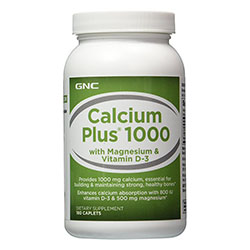
GNC is one of the most trusted brands in the nutritional supplement marketplace and for good reason. Their Calcium Plus 1000 is yet another example of why so many trust GNC for their dietary supplements.
Each of these Calcium Plus 1000 caplets contains 333 mg of calcium along with 266 mg of Vitamin D and 166 mg of magnesium. GNC regularly exceed their listed amounts though and with this calcium supplement you can expect to get nearly 30% more calcium than is listed on the label.
2. Swanson Calcium Citrate and Vitamin D

Each tablet of Swanson’s Calcium Citrate and Vitamin D contains 310 mg of calcium along with 200 mg of Vitamin D. This is a no-frills calcium/Vitamin D supplement. So if you’re after calcium and don’t need the secondary vitamins and minerals this is the supplement for you.
Vitamin D is an overlooked but important component of this simple supplement because low levels of vitamin D can negatively affect calcium absorption by the body.
3. Citracal Slow Release 1200
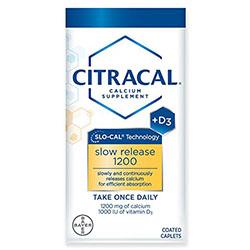
Whereas other calcium supplements require you to take small doses at various times of the day Citracal’s Slow Release formula means you only have to take a single 1200 mg capsule once a day.
Slow Release employs a state-of-the-art plant based binder to achieve its gradual dispersion and this makes it more effective and easier on your digestive tract as well. Vitamin D3 helps your body absorb the calcium more effectively and there’s also 80mg of magnesium in every capsule; a healthy proportion of your recommended daily dose.
4. Rainbow Light – Calcium Citrate Mini-Tabs
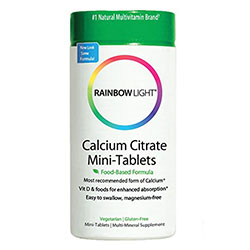
Each Rainbow Light mini tab contains 200 mg of calcium and 200 mg of vitamin D to aid your body in absorption. This particular supplement also provides spirulina, boron and horsetail extract which are reputed to further aid in the absorption of calcium.
These are compact tablets as the name “light” implies and there’s no magnesium here. But for most people that won’t be an issue. The presence of boron is a welcome change since it’s important for brain function and to facilitate a variety of physiological functions.
5. Solaray – Calcium Magnesium Zinc
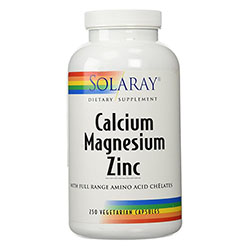
Solaray’s Calcium, Magnesium and Zinc supplement is a premium supplement designed to provide you with the calcium you need along with a couple of crucial supporting elements.
Those include zinc which is vital to immune system function, healing and overall development. And magnesium, which helps maintain healthy bones and teeth and is beneficial to the nervous system, heart and musculature.
6. Solgar Calcium and Magnesium with Vitamin D3
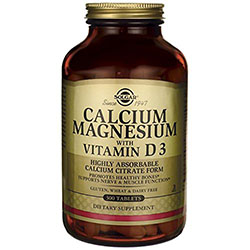
Solgar Calcium and Magnesium with Vitamin D3 is loaded with dietary essentials necessary to the maintenance of strong bones, teeth and muscles. To ensure the calcium and magnesium get where they’re supposed to go Solgar includes the great calcium facilitator, Vitamin D3.
Together the 3 components of each capsule shore up natural deficiencies that occur in most people, even those who are fairly scrupulous about their diets.
7. Amway Nutrilite Cal Mag D Advanced
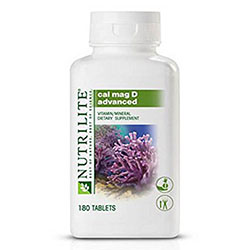
Most people don’t think of Amway when they think of supplements but maybe they should. Their Nutrilite Calcium, Magnesium and Vitamin D Advanced capsules provide a moderate amount of all three vitamins and minerals for those with healthy dietary habits who want a little something extra to fill in any gaps.
Every component of this Amway supplement works in harmony with the other components to provide comprehensive benefits to the musculoskeletal system.
8. Bluebonnet Calcium Citrate Magnesium and Vitamin D3
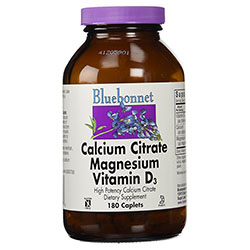
Bluebonnet has put together a powerful Calcium supplement that features calcium citrate along with magnesium and Vitamin D3.
D3 of course is the vitamin the helps promote the body’s absorption of calcium while magnesium helps with the maintenance of the musculature, which needs to work hand and hand with your bones every minute of every day. All three components of this Bluebonnet supplement work together to keep you feeling strong and vital.
9. Nature’s Way Calcium Complex Bone Formula
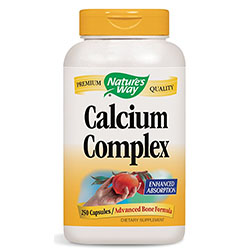
Nature’s Way Calcium Complex provides 500 mg of essential calcium in every capsule as well as Vitamin D3 to foster absorption, Vitamin B6, Folic Acid, Magnesium and Zinc.
It’s a streamlined multi with an emphasis on providing you the calcium you need and the means for your body to make use of it. Maintain proper bone density and keep osteoporosis and other bone maladies at bay with Nature’s Way Calcium Complex Bone Formula.
10. Schiff Super Calcium Carbonate 1200 mg
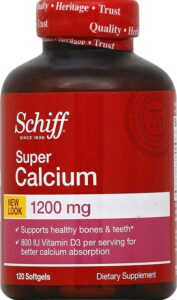
The final supplement on our top 10 list is from Schiff. Their 1200 mg Super supplement is a shot in the arm to those suffering from calcium deficiency. It’s formulated with Vitamin D3 to ensure the extra calcium is delivered where it’s needed.
In addition, calcium carbonate serves the dual purposes of delivering the essential calcium you need while also providing the means to quiet stomach disturbances that cause heartburn. A valuable combination.
–
FAQs
What Is Calcium?
Calcium is one the most important minerals (1) in the body. Without enough our bones become weak and brittle, brain function is compromised, we have problems with our teeth and even our memory begins to wane.
Calcium is found naturally in dairy products as well as green leafy vegetables, broccoli, various fruits and other foods. The human body cannot produce calcium on its own. Therefore it must be introduced from the outside. Calcium supplements, like the 10 best profiled above, are a smart way to get the additional calcium you need to make up for any dietary shortfall.
What Are Calcium Supplements?
Calcium supplements are concentrated doses of calcium typically packaged with Vitamin D3 which facilitates absorption (2). Other vitamins and minerals may also be included that help with related parts of the physiology like the muscles and heart. The fact is the average person needs about 1000 mg of calcium per day.
Achieving that level of calcium intake is not easy, however, when you consider the average glass of milk contains only about 300 mg. The bottom line is that there is little chance of harm in occasionally taking more than the recommended daily amount of calcium, but there are definite negative effects to not taking enough.
What are the Benefits of Calcium?
We mentioned some of the benefits above but they bear repeating because calcium is not something you want to under-consume. Those benefits include:
The maintenance of health bones.
Maintenance of the cardiopulmonary system.
Much needed tooth support through the jaw.
Enabling optimal absorption of minerals.
Helping to stave off osteoporosis.
Regulating pH levels in the blood.
Aiding in memory retention.
There is also some evidence to support the notion that calcium can help fight depression (3) as well. The symptoms of calcium deficiency are not always obvious and may include such things as muscle spasms, tingling in the extremities and memory loss.
Are There Side Effects to Taking Calcium?
Calcium is not known to generate any major side effects when taken as directed. But some people have reported the following when taking large amounts of supplemental calcium:
- Headaches
- Constipation
- Dry mouth.
Muscle pain.
If you go totally overboard with your calcium intake you may experience hypercalcemia (4) which typically manifests itself in digestive problems, muscle aches, nausea and on rare occasions cardiac problems.
Happily this condition can be avoided simply by limiting your supplemental calcium intake to the recommendations on the package.
When Should I Take Calcium?
Anyone who has reason to think they are not getting enough calcium in their normal diet should consider taking supplemental calcium. If you already take a multivitamin it’s a good idea to take your calcium supplement at a different time of the day. Older people in particular often need to take supplemental calcium. Below are the recommended daily amounts of calcium by age and sex for older adults (5).
Women over 50: 1,200 mg per day
Women under 50: 1,000 mg per day
Men over 70: 1,200 mg per day
Men under 70: 1,000 mg per day
While taking more than the recommended amount of calcium on occasion is not likely to cause any problems regularly taking too much could result in the above mentioned hypercalcemia. Keep in mind too that it’s generally a good idea to find a calcium supplement that also includes Vitamin D3.
What Should I Look for in a Calcium Supplement?
There are a lot of calcium supplements to choose from and many will do a fine job. It’s important though to only purchase such supplements from reputable manufacturers. Because the sad fact is there are plenty of unscrupulous people out there marketing placebos as various types of supplements. So the first thing to look for in a calcium supplement is an established company with a good reputation. Beyond that you’ll want to be aware of:
Total calcium content – If you have reason to believe you are calcium deprived you’ll want to make sure your supplement contains at least 500 to 1000 mg in each capsule. There are others out there that contain only 200 mg or even less. These are made for people who are just looking to fill in the blank spaces in their otherwise impeccable diet. If you need more, get more.
The type of calcium – There are several different types of supplemental calcium on the market including, calcium carbonate, calcium citrate, calcium chelate and others. Different kinds of calcium are absorbed at different rates so you may want to consult your physician to see which type is just right for you.
Secondary ingredients – While the amount and type of calcium in a supplement is the most important thing other secondary ingredients are important too. A supplement that includes Vitamin D3 (and many do) should always be considered since Vitamin D3 is important to calcium absorption. Magnesium and Zinc are also synergistic minerals that help shore up other elements of the physiology that are related to the skeletal system.
How often do you need to take them? – With some calcium supplements you need to take them at various times of the day. This can be a problem for some who wind up forgetting. If you think there’s a chance you’ll forget to take your supplemental calcium at different times look for a slow release calcium like Citracal Slow Release.
Value/Price – Some calcium supplements are pretty expensive. You need to weigh whether or not the extra cost is worth it before buying expensive supplements of any kind. A general rule of thumb is that as long as the brand is widely recognized and comes well recommended it doesn’t necessarily need to be the most expensive on the market to do the job you want it to do. If you like, calculate the per capsule price before buying. This will give you a good idea of the product’s real cost.
What is the best form of Calcium to take?
Calcium is an essential mineral that is important for many functions in the body, including building and maintaining strong bones and teeth, nerve function, and muscle function. There are many different forms of calcium supplements available, and the best form for you may depend on your individual needs and preferences. Here are some of the most common forms of calcium supplements:
- Calcium carbonate: This is the most common and least expensive form of calcium supplement. It is often taken with meals because it requires stomach acid to be absorbed properly.
- Calcium citrate: This form of calcium is easier to digest and absorb than calcium carbonate, and it does not require stomach acid for absorption. This makes it a good option for people who have low stomach acid or are taking medications that reduce stomach acid.
- Calcium phosphate: This form of calcium is less commonly used as a dietary supplement, but it is sometimes used as a fortifying agent in food.
- Calcium lactate: This form of calcium is absorbed more slowly than other forms, but it may be a good option for people who are sensitive to calcium carbonate.
- Calcium gluconate: This form of calcium is less concentrated than other forms, so larger doses are needed to get the same amount of calcium. It is absorbed well, but it is more expensive than other forms of calcium.
Calcium is vital to the maintenance of healthy bones and teeth and is a mineral far too many people are deficient in. This deficiency often goes unnoticed until later in life when a person develops osteoporosis or severe dental problems (6).
The calcium supplements profiled above will help you stave off calcium related health issues and maintain a healthy musculoskeletal system throughout your life.


3 Comments
What Vitamins Should Men be Taking at Different Points in Their Life? – Nutrition Diet News · November 3, 2021 at 11:23 am
[…] a multivitamin/multimineral that contains all of the above listed nutrients (vitamins A, B, C, D, calcium and magnesium), plus as many of the following as […]
What Vitamins Should Men be Taking at Different Points in Their Life? – Health Updates By Evelyn · November 3, 2021 at 12:31 pm
[…] a multivitamin/multimineral that contains all of the above listed nutrients (vitamins A, B, C, D, calcium and magnesium), plus as many of the following as […]
What Vitamins Should Men be Taking at Different Points in Their Life? – Diet Tips By Paul · November 3, 2021 at 1:35 pm
[…] a multivitamin/multimineral that contains all of the above listed nutrients (vitamins A, B, C, D, calcium and magnesium), plus as many of the following as […]
Comments are closed.